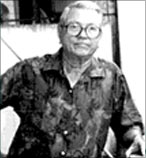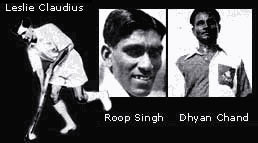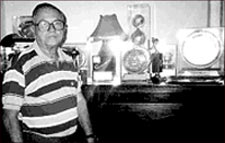
From our archives: Payal Singh Mohanka on the Indian hockey legend who passed into the ages on Thursday.
His frail physique belied the strength within. And few would have imagined that the quiet, unassuming, 'bamboo-legged' boy would climb heights of glory. But accolades awaited Leslie Claudius, who strayed into the hockey field by sheer chance. Today the former Indian Olympic hockey captain and the first Indian to play in four consecutive Olympics, lives a retired existence in Calcutta.
It has been a simple life rich with accomplishment. "I have had my share," he says with an air of finality. And though it was sheer joy while it lasted, Claudius is certain about one thing: if he was to relive his life, he would not choose to be a hockey player.
The present scenario is dismal. More so for Claudius who had played in the golden era of Indian hockey. Today the sport is at its lowest ebb. If he was reborn a sportsman and had to choose his sport, it would be cricket. The unsavoury controversy regarding match-fixing notwithstanding, "These charges of match-fixing will subside. Besides nothing has been proven," adds Claudius.
 There is no bitterness but a quiet calm on his bespectacled face as he is transported back to those days of glory. India reigned supreme in the game. The standard was impressive. There were six teams representing the country. Their brilliant performance would mesmerise the crowds. Sports lovers thronged to catch a glimpse of the world champions. The winners of gold medals inspired sports-loving youngsters.
There is no bitterness but a quiet calm on his bespectacled face as he is transported back to those days of glory. India reigned supreme in the game. The standard was impressive. There were six teams representing the country. Their brilliant performance would mesmerise the crowds. Sports lovers thronged to catch a glimpse of the world champions. The winners of gold medals inspired sports-loving youngsters.
As a teenager Claudius was no exception. He too dreamt of making it to the Indian team. A dream which seemed unlikely to be realised as he was a footballer!
"I was initially a footballer," he recalls, with a smile. He was playing for the Bengal Nagpur Railways, the BNR football team. It was during the 1946 Beighton Cup hockey tournament that his career in the game began. BNR, which was one of the largest hockey outfits of the forties and fifties, had two prestigious teams -- First XI and Second XI -- which participated only in the Beighton Cup.
Just before the match, the centre-half of the First XI was injured. BNR Second XI was then asked to provide a replacement, but they expressed their inability to part with their player. And suddenly, much to his amazement, Claudius, who was watching the game, found a hockey stick being thrown towards him. The team's captain, Dickie Carr, who played football with him, was asking him to join the game. Claudius could not believe his luck. He had only recently realised that he was more keen on being a hockey player than a footballer. He took up the challenge and entered the field.
For the next 10 days he continued to play for the First XI. Regular coaching sharpened his natural flair for the game. Even when the regular centre-half resumed play Claudius was not discarded. Retaining him in the same position, the coach moved the regular centre-half to deep defence and pulled the right-back out of the game.
For Claudius it was time to say farewell to football. And this marked the beginning of his hockey career.
In spite of playing brilliant hockey, the team lost in the finals but Claudius persevered to improve his skills... with every tournament, with every game. In his initial years in the game, Claudius fondly remembers, he was greatly encouraged by Olympians like Joe Gallibardy, Carl Tapsel and Dickie Carr who played for BNR too. "They even had my hockey stick cut shorter by three inches so that I could use it more effectively," he recollects.
 Though he never played with the heroes of Indian hockey like Dhyan Chand and Roop Singh, he has fond memories of Dhyan Chand who was a good friend, "His stickwork was brilliant.
Though he never played with the heroes of Indian hockey like Dhyan Chand and Roop Singh, he has fond memories of Dhyan Chand who was a good friend, "His stickwork was brilliant.
"Once I remember the audience even examined his stick to check if there was glue on it! When I was playing, he was a selector. He called me a sparrow. He thought I was like a small bird hopping around wherever the ball was I was there!" A smile lights up his face as he adds, "And Dhyan Chand would say, 'Claudius selects himself, now I have to select the rest of the team!' "
Such encouragement and his perseverence paid off. Within a year he was selected to play in the 1948 London Olympics. Those were glorious days for him. The opening ceremony was a heady experience for the 21-year-old Claudius. "As the Indian contingent stepped into the arena there was a resounding applause. The world champions had arrived. We were elevated into heaven. It was a wonderful feeling!" he recalls.
The Indian team was exceptionally skilled despite the absence of coaches at that time. "We never had coaches in the real sense. It was only 1952 onwards that coaches started accompanying the team. We used to train on our own. Just watching some of our brilliant players was the best kind of coaching," he recalls. "The entire team sat around a miniature hockey ground and planned every move. Very often the coach never came into the picture."
Claudius, who represented India in hockey from 1948 to 1960, created a world record by playing in four consecutive Olympics: 1948 in London, 1952 in Helsinki, 1956 in Melbourne and 1960 in Rome. The Indian team was victorious in the first three Olympics. But the mention of the 1960 games in Rome stirs memories of the disappointment the team had felt. Claudius, who captained the team, says, "Our team played brilliant hockey. We were the superior team yet we did not take advantage of our superiority. That's why it was sad. Even today that hurts. If they were better, then there would be no regrets."
For the Indian team it was a missed opportunity. Both the defenders thought the other was going for the ball but it trickled past. Pakistan took advantage of this lapse and won by one goal. This was particularly demoralising for Claudius. For had they been victorious, it would have been a fitting end to his career.
The late fifties saw competition from Pakistan and European countries threatening India's supremacy. Perhaps complacency had set in. Claudius cannot help but add somewhat wistfully, "The Indian Hockey Federation should have seen the signals." But it was the beginning of the end for Indian hockey.
 Claudius, who received the Padma Shri a decade after his retirement from international hockey, says, "There were rumours that due to the Indian team's failure to win the gold medal in Rome in 1960, I had earlier not been considered for the award."
Claudius, who received the Padma Shri a decade after his retirement from international hockey, says, "There were rumours that due to the Indian team's failure to win the gold medal in Rome in 1960, I had earlier not been considered for the award."
It is only when Jagjit Singh, chairman of the customs and excise department, intervened, that Claudius, who worked for the Calcutta customs, was honoured for his tremendous contribution to the sport.
Apart from being a brilliant player, Claudius had been manager of the team as well. In the seventies he escorted the team to Tehran, Bangkok and Australia. There was, however, one ambition that remained unrealised. Claudius was very keen to coach the national side, but was denied the chance as the government's policy stipulated that coaches should be diploma holders from the National Institute Of Sports. Strangely, it never occurred to those who formulate such rules that a distinguished sportsman may be as good a coach, if not better, than one holding a diploma!
Disillusioned, Claudius then offered his services as a selector, and in 1982, accepted the post of observer on the technical committee. But once again there were obstacles. His assignment as an observer involved a tremendous amount of travelling. "The committee set up by the government was not willing to pay our travelling expenses. They wanted us to fend for ourselves," says Claudius who quit the post in 1984.
The sport seems to be doomed in most states where it once flourished. "In Bengal it has become a seasonal game, played for just a couple of months each year," says Claudius. Today a lack of opportunity and proper coaching prevent its young talent from maturing into top-class players. Schools and clubs have no facilities for this sport. The gear is expensive. Even the surface has changed. Today the world plays hockey on astroturf, a synthetic surface and not grass.
Claudius, who retired from the Calcutta customs as an assistant collector after 36 years of service, has not been able to break all ties with the sport. He has been roped in by the Umpires Association of Bengal, a group which is trying to revive hockey in the districts. "I think it is a lost cause. In our time a good sportsman got a good job. Now there is nothing in hockey. But I have gained so much from the game, I can't say No. If I can do anything for the game, I would gladly do it," he adds.
There is no bitterness. Just a quiet calm and a tinge of regret, "I have never got anything from the government. These days young sportsmen get hefty cash awards but in our time there was no such thing. Even though we gave our life to sport. It was a different era," says Claudius. The shy, young player who had been brought up in Bilaspur in Madhya Pradesh had never imagined that he would be a hero on the hockey field one day.
For the moment he brushes aside his memories of the game which has become the neglected offspring of Indian sport. Armed with his passion for sport, the 73-year-old former Olympian is all set to leave for Sydney to witness the world's greatest sporting event.
RELATED FEATURE: 'Claudius was clearly a man of method'












 © 2025
© 2025